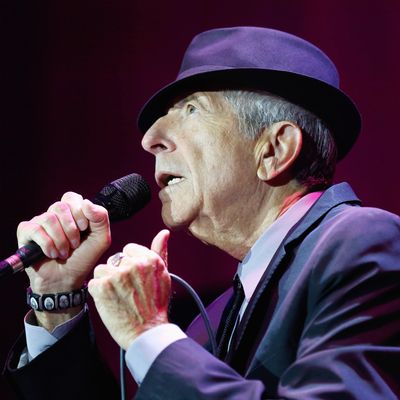
Leonard Cohen’s new album, You Want It Darker, arrives under a cloud. Leading up to the album’s October 21 release, Cohen’s fans were dismayed to learn, in a sweeping New Yorker profile, that the legendary songwriter is ailing and, in his words, “ready to die.” Cohen walked that back a few days later, saying, “I intend to live forever,” but it’s still awfully tempting to hear the album as a valedictory effort. Tempting, but according to Cohen’s son, Adam, who produced the new album, wrong. “Even if the circumstances of my father’s age and health were all some wicked pulling-of-the-heartstrings sentimental bullshit, the truth of the situation is simply that we made an incredible record,” he said.
That’s not to say that You Want It Darker came easy or that the 82-year-old Cohen is in fine fettle. Speaking on the phone from his home in Los Angeles, birds chirping in the background, Cohen the younger elaborated — a little — on his father’s health, his own relationship to a famous muse, and the joy that went into making a not-exactly-joyous album.
Given the stature of your father’s work, did you have any apprehension about helping him make the new album? It wasn’t as if you were stepping into a low-stakes environment.
First of all, I’d given up hope that my father would ever consider me as a collaborator. I felt that he had a certain concern over the appearance of nepotism, that he didn’t want to feel like he was giving preferential treatment to his ne’er-do-well child. In this occidental culture that I live in, for a child to be able to prove to be useful to a parent is such an uncommon thing. It was a lifelong dream to be able to be shoulder-to-shoulder with my father and to be able to show my capacity to demonstrate my worth in the same line of work.
How did it arise that he finally asked you to work with him? Were you frustrated that it took so long?
No, no. It was deeply gratifying. The how it came about is, other than my own position within the family business having risen to the point where I could finally be in the discussion, was that I happen to have introduced him to Patrick Leonard, the producer of my father’s last couple of records. They’d invited me to participate in creative conversations about those projects. Then, with You Want It Darker, there I was sitting on the floor like a coffee boy at the very onset of the record, and when Patrick was unable to continue working on it and my father’s discomfort grew so severe that the project stalled I was asked to take over. I was jubilant about having finally been invited to participate by his side and to have the opportunity to demonstrate my wherewithal.
Can you clarify the state of your father’s health at the moment? That New Yorker story had everyone worried.
He’s 82 and he’s put on some very hard miles. He’s suffered from multiple compression fractures. These are not things that heal very quickly in old folk. It’s safe to say that he’s dealing with failing infrastructure and subsequent pain and discomfort. As for the rest, I’m not interested in conjecture.
Were you following, earlier this year, when the farewell your father sent to his old muse, Marianne Ihlen, the subject of “So Long, Marianne,” went viral?
Yes, I saw that.
Does it feel at all strange to know that your father had this iconic relationship with a woman who is not your mother? Or even that he had such a reputation as a ladies man. That seems like it could lead to some conflicting emotions for a son.
Not at all. On the contrary, I was in touch with Marianne. Marianne came to pretty much every show I did in Europe. Well, that’s a gross exaggeration. Marianne often came to my shows and she and I were email correspondents. The affection that my father had for Marianne and the beautiful evidence that he left of their relationship in that memorable song was a treat for me and you alike. In fact, I’ll go one step further: I think “So Long, Marianne” is one of his greatest songs and I never understand why it wasn’t as popular as “Hallelujah.”
I have to ask: As his producer, did you ever give feedback on Leonard Cohen’s lyrics?
My father is not inclined to forensic examination of lyrics. Everyone in his immediate midst knows better than to engage him on the subject. And what songwriter of any era has produced songs that speak for themselves as clearly as Leonard Cohen’s songs? Certainly, if you come from his stock and share his lexicon, there is no explanation needed for the intention of a song.
Do you know what you and your father’s next projects are?
I don’t know what he and I will do musically. I do know that he’s working on a book of poems already and has in mind to have the next record be an orchestral piece. It will be reprises, as there is on the album, of existing pieces of work orchestrated by the incredibly capable and talented Patrick Leonard.
Was it easy to work with your father? I could imagine the job of a producer being made simpler for someone without a familial connection to worry about.
This whole process, we were riding some mysterious wind, as my father calls it. The standard amount of deliberation that goes into making a record was mercifully light. Although, there was some resistance here or there at times either from me or my father, who of course always had veto power, what characterizes this album was a sense that it was meant to be it was exactly what it is. I say that knowing full well that my father was in acute discomfort. But that, too, benefited the album, in the sense of urgency that informed the whole process. The immobilized condition that he found in himself led to a giant decrease in distractions. So it’s as if all aspects of both his life and mine coalesced to create the most opportune circumstances for a remarkable record to be. There were also moments of joy, where an infirm old man would stand up with his cane and dance in front of the speakers. And there were bouts of laughter when we would listen to a song over and over again as if we were teenagers. This was with help of medical marijuana.




